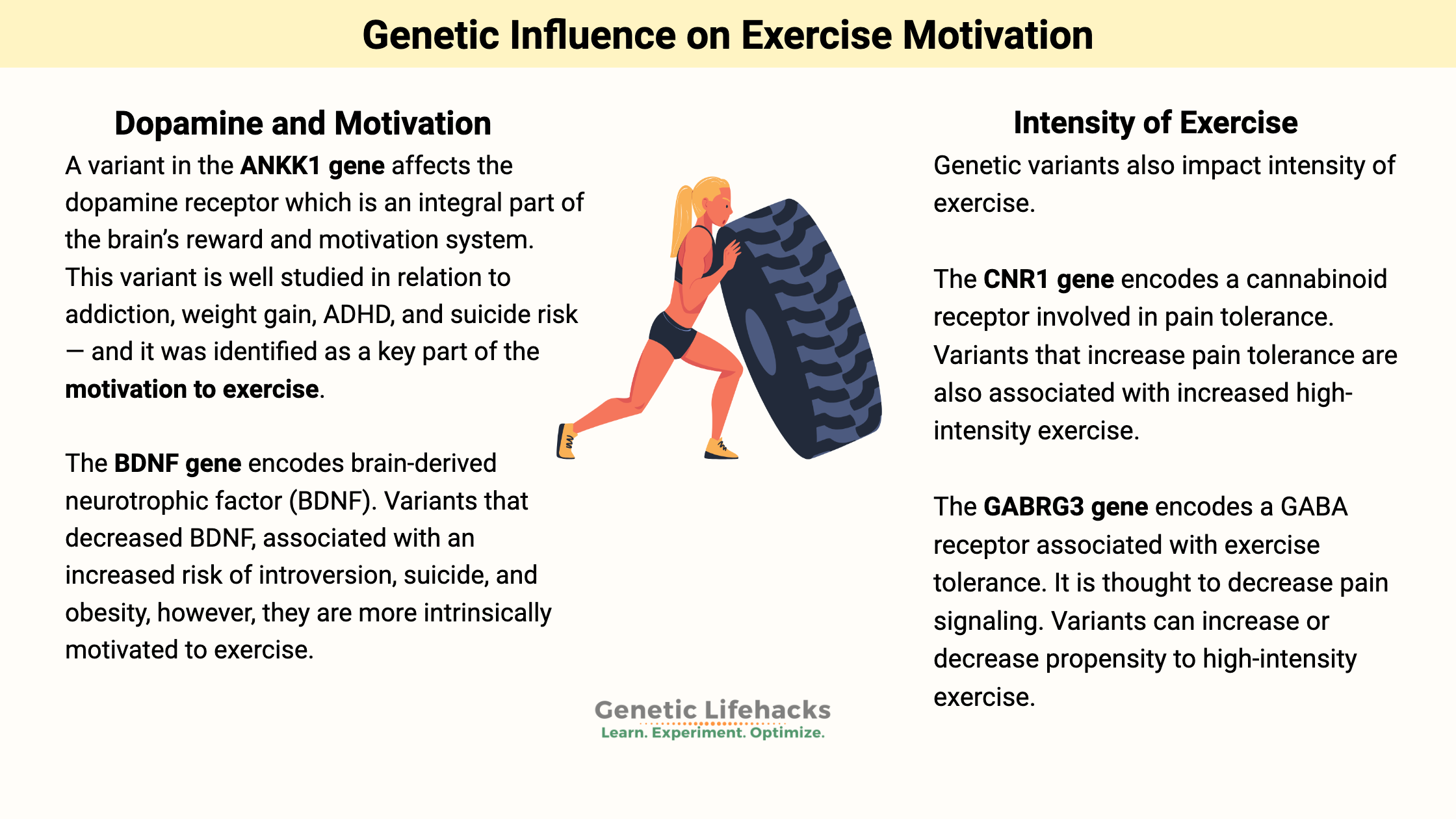Key takeaways:
~ Exercise is essential for maintaining physical and mental health, but it can be difficult to find the motivation to get up and get moving.
~ Genetic variants influence our ability to find motivation for exercise.
This article will explore the latest findings on the genetic factors that may play a role in our motivation to exercise and how we can use this knowledge to improve our own fitness habits.
Members will see their genotype report below and the solutions in the Lifehacks section. Consider joining today.Dopamine and motivation:
Let’s face it. Some people don’t like to exercise, and no matter how many Instagram inspiration posts they see, they aren’t going to head to the gym. Most people in the US are too sedentary, and 90% of Americans don’t meet the recommendations for physical activity. The US Department of Health and Human Services claims that adults need 2 1/2 hours/week of moderate-intensity aerobic exercise and two days/week of strength training.[ref]
However, the internet is full of exercise gurus who are obviously well motived to get to the gym each day, and you likely know a few people like this as well. What is the difference between these naturally motivated individuals and the rest of us couch potatoes?
A study in the journal Behavioral Brain Research paints a fascinating picture of why some people are more motivated to exercise. The study looked at the dopaminergic system to see how people’s genetic variants could alter the ‘reinforcing value’ of exercise. The study examined 178 adults (average age 27) who wore activity trackers. The participants also rated how much they liked different exercises and sedentary activities.
According to the researchers, one factor in adhering to the guidelines is “the reinforcing value of exercise relative to a competing alternative behavior”. In other words, would you rather exercise or do something else?
Genetic variants linked to exercise motivation and intensity:
Dopamine and reward:
A variant in the ANKK1 gene affects the dopamine receptor which is an integral part of the brain’s reward and motivation system. This variant is well studied in relation to addiction, weight gain, ADHD, and suicide risk — and it was identified as a key part of the motivation to exercise. The results showed the dopamine-related variant was involved in the reinforcement value for exercise — or, in other words, whether people felt that the reward of exercising was greater than doing other non-physical activities such as watching TV, playing video games, etc.[ref]
BDNF is involved in the way that the brain works and in neurogenesis. Genetic variants in BDNF are linked to motivation, depression, attention to detail, and appetite. Exercise increases BDNF expression, but a study showed that people who have genetically higher BDNF aren’t quite as motivated to exercise.[ref][ref]
Intensity and feeling no pain:
The CNR1 gene encodes a cannabinoid receptor variant that has also been associated in other studies with exercise tolerance. Cannabinoid receptors are involved in pain tolerance, and variants can increase someone’s threshold for feeling pain.
The GABRG3 gene encodes a GABA receptor associated with exercise tolerance in previous studies. It is thought to decrease pain signaling.[ref]
Exercise Motivation and Intensity Genotype Report:
Lifehacks:
Perhaps understanding the reason why you don’t want to exercise will motivate you to get beyond that and start working out more :-)
It is always interesting to see the genetic pathways involved in a topic and then try to manipulate that pathway for a benefit. Here are some suggestions on exercise motivation, but I encourage you to think outside the box and come up with what will work for you.
There are a lot of good reasons to include exercise in your routine. From heart health to longevity, moderate exercise is vital.
Dopamine rewards:
Related Articles and Topics:
References:
2015-2020 Dietary Guidelines | Health.Gov. https://health.gov/our-work/nutrition-physical-activity/dietary-guidelines/previous-dietary-guidelines/2015. Accessed 4 Jan. 2023.
Flack, Kyle, et al. “Genetic Variations in the Dopamine Reward System Influence Exercise Reinforcement and Tolerance for Exercise Intensity.” Behavioural Brain Research, vol. 375, Dec. 2019, p. 112148. ScienceDirect, https://doi.org/10.1016/j.bbr.2019.112148.

